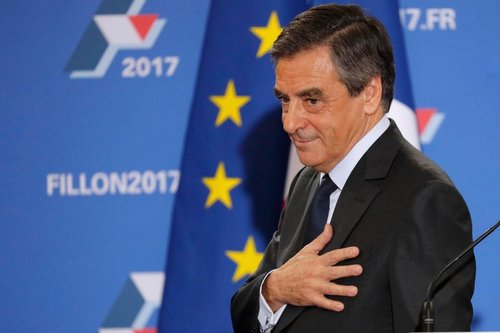
Is the National Front Still the "Far Right" in France?
By Steve Sailer
11/28/2016
French politics are important in a symbolic sense because French political history probably ranks with American and British political history as the best known in the world, and perhaps the best known for ideological purposes. The current move to the right in France is thus worth paying attention to. From the NYT:
François Fillon Wins Center-Right Nomination for French PresidencyBy ADAM NOSSITER NOV. 27, 2016
PARIS — French voters chose a socially conservative, budget-cutting former prime minister on Sunday to lead the center-right Republican Party in next year’s presidential election. Once again, the outcome upset pollsters’ initial predictions, and it paved the way for a likely face-off with the country’s far-right party in 2017.
François Fillon, 62, a sober, dark-suited government veteran who called for economic sacrifice, major changes in the French workplace and a crackdown on immigration and Islam, won about 67 percent of the vote in the primary contest on Sunday, crushing his more centrist opponent, Alain Juppé, who is also a former prime minister.
French presidential elections are usually decided in two rounds, with the first round winnowing the field to two candidates. Having won his party’s primary, Mr. Fillon is widely expected to be one of those two finalists in the general election in the spring.
It now seems increasingly unlikely that the current governing party, the Socialists, will produce the other. The French left is weak and in disarray after five years in which high unemployment rates and slow economic growth have barely budged. President François Hollande has not said whether he will run for another term, and many in his party hope he does not.
Instead, the second contender is widely expected to be Marine Le Pen of the far-right National Front. Her party has never been able to attract the backing of more than about one-third of France’s electorate, and for now at least, few analysts predict that it can win the presidency next year. But the xenophobic, anti-immigrant party has received a new lift from the triumph of President-elect Donald J. Trump in the United States.
Mr. Fillon, with his themes of restoring France’s identity and national greatness and his tough language on immigrants and Islam, has been making a clear play for Ms. Le Pen’s voters.
His promise to slash 500,000 government jobs and cut the budget by more than 100 billion euros (about $106 billion) could leave him vulnerable against Ms. Le Pen, who promises to safeguard France’s substantial safety net of government protections and spending. Mr. Fillon told supporters during the campaign that he was going to “break down the house,” but many in France don’t want the house broken.
Promises of top-to-bottom economic overhaul have generally brought thousands of demonstrators into the streets. Unions are already sounding warnings about Mr. Fillon’s plans to reduce the state’s role in the economy, and the National Front has heaped scorn on his proposals.
In his victory speech on Sunday night, Mr. Fillon emphasized traditional French rightist themes of restoring “authority” and “French values,” as he did throughout the campaign, when commentators largely dismissed his chances.
“In our country, there is an immense need for respect and pride,” Mr. Fillon told cheering supporters in Paris. “There is also a demand for the authority of the state, and for exemplary behavior from those who govern it. In my conduct, the voters of the right and the center have found the French values to which they are so much attached.”
His opponent, Mr. Juppé, campaigned on a “unity” theme that led many on the right to suggest that he was a leftist in disguise. The notes Mr. Fillon sounded were darker.
With many of his fellow citizens uneasy over immigration, terrorist attacks and the integration of Muslims, Mr. Fillon vowed to restore a more traditional France by strictly regulating Islam and limiting immigration, and promised an alliance with Russia to crush what he called “totalitarian” Islamists. Commentators have noted Mr. Fillon’s close relations with Vladimir V. Putin, Russia’s president.
Mr. Fillon served as an overshadowed prime minister when Nicolas Sarkozy was president from 2007-12. In the first round of voting on Nov. 20, he crushed his former boss, who had regularly humiliated him.
A Catholic from conservative, rural western France, Mr. Fillon entered Parliament in 1981; at 27, he was the house’s youngest member. Catholic voters who appreciated his positions against abortion and same-sex marriage supported him heavily in the presidential race, even though he has promised not to interfere with legal guarantees of either.
Mr. Fillon still sits in the National Assembly and lives in a medieval manor house near Le Mans with his family; he has five children. During the campaign, he spoke often of France’s identity and of instilling the country’s “national epic” in its schools.
So it looks like the next presidential election will pit Marine Le Pen vs. a Rick Santorum-like Catholic conservative, putting the National Front to the left of the Republicans on traditional class economic issues and not all that far to the right on cultural / identity issues. The usual history in France, projected into the future in Houellebecq’s Submission, is for the left to submit to the right to defeat the National Front, as in 2002. But maybe in the very long run the National Front will become the center-left party in France?
